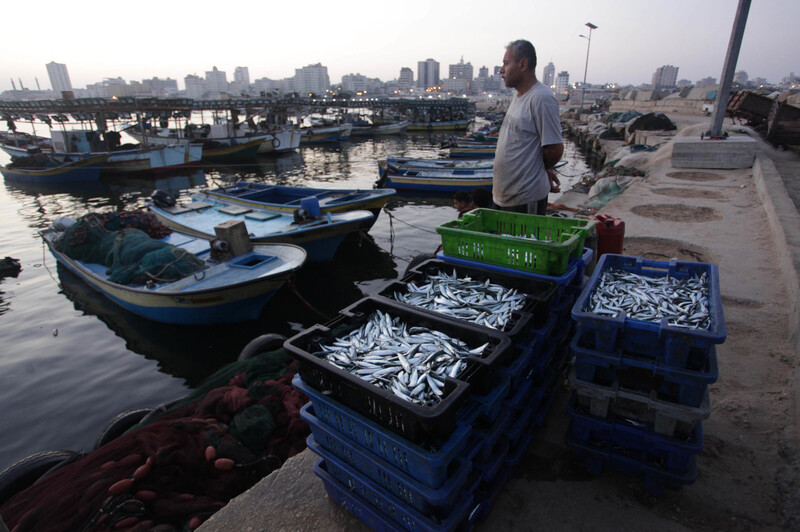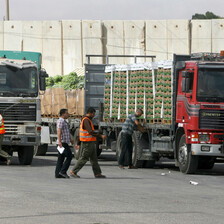The Electronic Intifada Gaza Strip 4 October 2013

Palestinians fishing off Gaza’s shore have come under both Egyptian and Israeli fire.
APA imagesGAZA (IRIN) - The shift of power in Egypt over the past few months has led not just to border closures for those wanting to cross into the country from Gaza, but also to a sharp reduction in the transport of basic goods, as well as fishing rights, further isolating the Strip’s residents.
The Egyptian army has stated that since it started operations in the eastern Sinai Peninsula in late June, it has destroyed more than 440 tunnels — 80 to 90 percent of detected tunnels — between Egypt and Gaza, in what is an ongoing operation.
The UN Office for the Coordination of Humanitarian Affairs (OCHA) has estimated that only ten tunnels are now operating, down from at least 300 operating tunnels prior to the clamp-down (“The humanitarian impact of reduced access between Gaza and Egypt,” 23 September 2013 [PDF]).
“They’re strangling us”
“They’re strangling us, even if they claim the opposite,” Jalal, 25, a tunnel worker, said. “This situation gives us no choice but to look to develop more approaches to keep tunnels working until a sustainable commercial terminal above the ground is opened.”
The tunnels are the main commercial trade routes in and out of the Gaza Strip, and the only way in or out that does not go through Israel, which heavily restricts crossings. The Agreed Principles for Rafah Crossing, signed by the Palestinian Authority and Israel in 2005, included plans for formal trade, but the deal was frozen when Hamas came to power in Gaza in 2006.
Egyptian officials and media claim the tunnels enable the smuggling of weapons and drugs, and even militants to Sinai, a claim the Hamas government has denied.
Jalal and his colleagues said they have not been paid for almost two months. Jalal, who was expecting his first son, said: “I want my son to live in better world, without limits, or borders, like the ones we’re suffering from now.”
On the coast, the story is similar.
“Everything has changed”
The Israeli navy restricts Gaza fishermen from traveling more than six nautical miles from shore, severely limiting their catches. Egypt used to allow fishermen to enter its waters, but in the last few weeks, Palestinian fishermen have been arrested and injured by the Egyptian navy, and their fishing boats have been damaged.
“This is not the right way to deal with brothers,” said Nizar Ayyash, head of the Palestinian Fishermen’s Society. He called on Egypt to stop the campaign.
On 30 August, five Palestinian fishermen were arrested in Egypt. They were charged with breaching Egyptian international waters, and were sentenced to one year in prison and fined $60 each.
“We used to reach the shores of al-Arish [a major city in Sinai]; the guards watched us coming and leaving. They allowed us to go and said nothing, but everything now has changed,” said Mahmoud, 30, a fisherman from Gaza.
“What’s happening now is worse”
After the arrest, Gaza fishermen were cautioned to stay away from the borders. But three days later, two fishermen were injured, and their boats were shot at by the Egyptian navy, this time in Gaza’s waters, according to Ayyash.
Abdullah Najjar, 55, said that his son Ibrahim was seriously injured and his boat was damaged after Egyptian soldiers shot directly at him and another fisherman. Ibrahim underwent surgery on his arm.
The Fishermen’s Society alleges other attacks on fishermen have also taken place over the last couple of weeks inside Gaza’s waters.
Approximately 50 percent of Gaza’s fish needs have, until recently, been transported through the tunnels and from fishermen trips in Egyptian waters. The UN agency OCHA stated that before July, nearly 118 tons of fish entered Gaza via the tunnels per month, making up for the fishermen’s shortfalls.
The clamp-down on tunnels could affect food security in Gaza, according to aid workers, and the World Food Programme (WFP) has estimated that, in the event of a complete tunnel closure, it will have to be ready to meet the needs of an additional 50,000 to 60,000 persons.
The current situation has parallels to late 2009, when Egypt constructed a wall at the border with Gaza. “We eventually overcame that situation,” said tunnel owner Khalil, 40, but “what’s happening now is worse.”
Shortages
According to OCHA, the closures had helped create “significant shortages of goods, including cheap fuel and construction materials.”
Khalil said Egypt’s operations have paralyzed his business. Formerly operational 24 hours a day, the tunnel areas are now quiet.
To avoid a humanitarian crisis, the Hamas-led authorities in Gaza have called on Egypt, other Arab countries and the US and its allies to assist in establishing a legal commercial zone and reopen the crossing for commercial purposes.
A recent boom in the construction sector in Gaza is now threatened by the tunnel closures. Less than 100 tons of construction material entered each day last week — compared to a daily average of more than 7,500 tons in June, according to figures from the Palestinian Federation of Industries cited by OCHA.
The World Bank recently said the measures were expected to cause a significant decline in construction activities in Gaza over the coming months (“Economic monitoring report to the Ad-Hoc Liaison Committee,” 25 September 2013 [PDF]).
Nabil Abu Muailek, head of the Palestinian Contractors Union, said that about 30,000 workers in the sector were now unemployed because of the halt of materials imports from Egypt, and the subsequent surge in prices.
While Israel announced last month that it would allow 50 trucks of construction materials for the private sector into Gaza through its Kerem Shalom crossing point, Abu Muailek said that this represented less than a quarter of what the market demands.
Obligations
In a recent statement, Gisha, an Israeli legal center advocating freedom of movement, said that while Egypt is not an occupying power in the Gaza Strip, it did have humanitarian obligations to Gaza’s residents.
“It must take into consideration Gaza residents’ right to freedom of movement and make the utmost effort to maintain a reliable and sufficient travel route through its territory,” Gisha stated.
“In contrast, due to Israel’s substantial control over the Gaza Strip, it has a duty, under the law of occupation, to enable Gaza residents to lead normal lives, including the possibility of leaving Gaza and returning to it.”
The Palestinian NGO Network and a number of Palestinian human rights organizations urged the US and its allies to bring about an end to the blockade on Gaza. In a statement issued to IRIN, it said that Israel, as the occupying power, is responsible for the ongoing deterioration in the economy and quality of life in Gaza because of the tight restrictions.
The network also called on Egyptian authorities to facilitate the travel of residents to and from Gaza and to consider the humanitarian situation in Gaza.
This item comes to you via IRIN, a UN humanitarian news and information service, but may not necessarily reflect the views of the United Nations or its agencies. All IRIN material may be reposted or reprinted free-of-charge; refer to the copyright page for conditions of use. IRIN is a project of the UN Office for the Coordination of Humanitarian Affairs.


